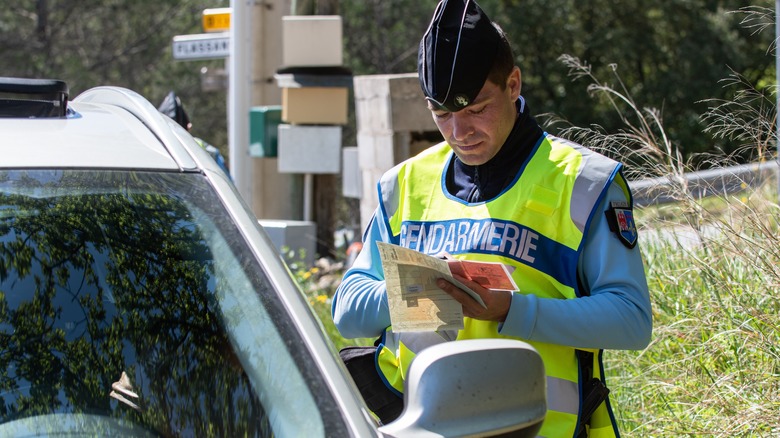The First Ever Speeding Ticket Was Given To A Man Going 8 Mph
Humanity has a fascinating history with the wheel. This crucial invention, according to ThoughtCo, arrived more than 5,500 years ago and was first employed by potters. It was only later that somebody had the additional brainwave of using it to get themselves (and other things) from point A to point B. Today's vehicles, of course, are unlike anything those early wheel users could ever imagine. Guinness World Records reports that the world land speed record for the fastest car was an incredible 763.035 mph (1227.985 kmph), achieved by Andy Green in the car Thrust SSC in October 1997.
Granted, this was achieved under extraordinary circumstances in Nevada's Black Rock Desert, and you wouldn't catch anyone hitting those speeds during a quick trip to the store. It's fascinating to consider just how primitive early cars were in comparison. Nonetheless, at the close of the 19th century it seems 8mph was an outrageous speed worthy of a ticket.
One Brit's need for speed
In the late 19th century, per the Wall Street Journal, horse-drawn carriages ruled the roads. Early cars came with advantages that their equine counterparts did not have. So-called 'horseless carriages' weren't reliant on the whims and health of another living creature, nor were they prone to pooping in the streets. They also, before long, boasted power far beyond that of several of the strongest and most magnificent horses.
As History Collection reports, Cadillac published a proud and boastful advertisement for its latest model in 1905. It proclaimed, "[To] enumerate the exclusive features of this magnificent new type would be to repeat the many points of excellence which have made the name CADILLAC represent all that is superior in automobile manufacture." The vehicle, according to the piece, wielded 26-30 horsepower and could achieve speeds of 50 miles an hour (around 80kmph). This certainly isn't what you'd call an impressive top speed today, but for its time, this Cadillac was quite the mover. Just a decade before, per Guinness World Records, 8mph (around 13kmph) was seemingly considered to be quadruple a sensible speed for a vehicle.
The person given the first-ever charge for speeding, according to the outlet, was Walter Arnold of the United Kingdom. In January 1896, Arnold's Benz was traveling through Kent at 8mph (13kmph). This, quite clearly, was a blistering and nigh-inconceivable speed (the limit being less than 2mph, or 3.2 kmph), and the daredevil Arnold was swiftly apprehended.
Possibly changing the history of the motor car
Arnold, Guinness World Records goes on, wasn't found guilty of just one crime. Or two. Or even three. His wrongdoings were as follows: "[T]raveling at more than two miles per hour," "using a locomotive without a horse on a public road," "allowing said locomotive to be operated by fewer than three persons," and "failing to clearly display his name and address on the locomotive." Just two days later, he was found guilty of all of these charges. What punishment does such egregious speeding get you? A fine that amounts to around $312 today. That same year, his company released the Arnold Motor Carriage, so he clearly knew more than a little bit about what the autos of the time were capable of.
Historic UK adds that this was the era of the classic "man with a flag" who had to walk in front of all such vehicles, and that the absence of one in this instance was just one way in which Arnold had flouted the law. Were these laws still relevant during these changing technological times, however? This, it seems, was the argument of the driver's barrister: These laws were written before cutting-edge vehicles like Arnold's came along. They also reportedly changed not long after the incident, allowing drivers to operate vehicles alone (and without the need of said flag-brandisher). Perhaps that 50mph 1905 Cadillac would never have come about without Arnold's wild ride.


